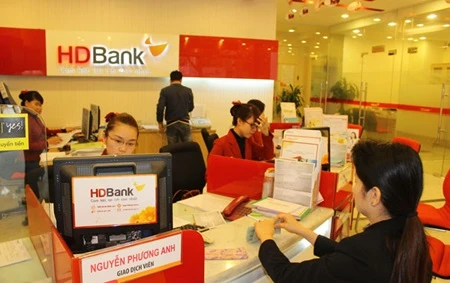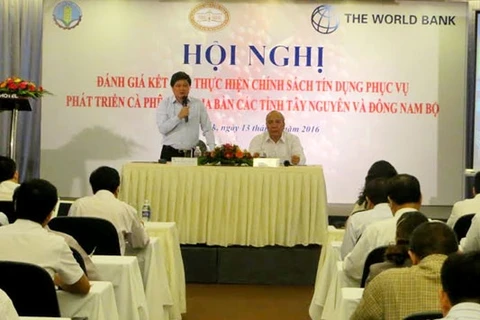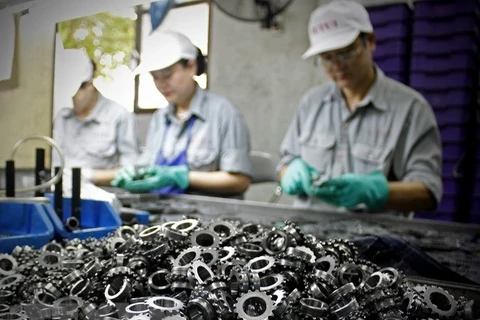 The SBV will assign the Vietnam Bank for Agriculture and Rural Development (Agribank) to coordinate with other commercial banks to research and urgently provide solutions to support the expansion of coffee replanting in the Central Highlands. (Photo: VietnamPlus)
The SBV will assign the Vietnam Bank for Agriculture and Rural Development (Agribank) to coordinate with other commercial banks to research and urgently provide solutions to support the expansion of coffee replanting in the Central Highlands. (Photo: VietnamPlus) Hanoi (VNA) – The State Bank of Vietnam (SBV) will instruct credit institutions to collaborate closely with businesses to offer better credit access in the Central Highlands Region.
On the sidelines of the Banking-Business Connection Programme 2023 in the Central Highlands region, SBV Deputy Governor Dao Minh Tu said the bank has fully identified challenges faced by businesses in the region. It will provide guidance to credit institutions and businesses on how to address difficulties in accessing credit.
Reporter: What solutions have been implemented to increase access to credit for businesses in the Central Highlands region?
SBV Deputy Governor Dao Minh Tu: The State Bank of Vietnam has asked credit institutions to expand lending to assist businesses in addressing challenges resulting from the dual impact of the global economy and internal issues.
To help borrowers access credit sources, the State Bank of Vietnam is actively promoting numerous banking-business connection programmes nationwide. Through direct dialogues at these events, banks and businesses can identify solutions to resolve relevant difficulties and challenges.
The banking sector is willing to deploy solutions in order to help businesses address difficulties and meet the capital demand for economic development in the Central Highlands.
Reporter: Some businesses proposed that there should be special policies for lending in the Central Highlands region. Could you share the State Bank of Vietnam’s views and orientations on this issue?
SBV Deputy Governor Dao Minh Tu: We understand the specific characteristics of the five Central Highlands provinces. We have allocated capital for the agricultural sector and special industries like coffee, pepper, and cashew. The banking sector has also paid attention to providing capital for the cultivation of durian and other products in the region in recent years.
I totally agree that it is necessary to have special credit policies, especially for the coffee industry.
The coffee replanting programme was initiated 5-7 years ago but has not been fully implemented. Commercial banks with large lending portfolios for the coffee industry need to continue to research and develop appropriate policies to support the regional localities to help this industry become a strong and leading crop in the Central Highlands region.
We will direct Agribank, the wholly state-owned bank, and a major lender in rural and agricultural areas, to coordinate with other commercial banks to research and urgently provide solutions to support the expansion of coffee replanting.
Banks should support businesses by providing unsecured loans, monitoring cash flow, and reducing collateral requirements involving real estate, while ensuring the principle of capital safety.
These are issues that the State Bank of Vietnam is concerned about and it will provide guidance to commercial banks to strengthen their efforts in this regard in the future.
Reporter: Many businesses recommend that the banking sector needs to have policies to promptly provide capital for businesses to prepare for the upcoming crop. What do you think about this proposal?
SBV Deputy Governor Dao Minh Tu: Businesses really need quick and timely capital support, especially in the cultivation season. To solve this problem, commercial banks must consider the consumption market status, and closely follow the capital demand of businesses to set an appropriate credit limit.
In addition to banks’ efforts, localities, departments and associations should work closely with banks to facilitate capital access of people and businesses, especially those specialising in processing and exports.
Reporter: Do businesses hope for more stable interest rates to help them focus on their production and operation?
SBV Deputy Governor Dao Minh Tu: In relations between businesses and banks, enterprises usually say interest rates are still high, while many banks say interest rates have fallen. But we must also admit that there are still banks that lend at high-interest rates because they previously mobilised at high rates.
Many banks do not reduce interest rates for their customers. Interest rate reductions are rare.
The State Bank of Vietnam cannot decide lending interest rates. However, interest rates must be consistent with the general level and banks must make this available to the community. The Government and the State Bank of Vietnam have directed commercial banks to reduce lending interest rates in many forms.
Banks still have concerns about criminalizing civil relations. Therefore, if customers are unable to repay their debts due to something like bankruptcy, the general approach is not to escalate the issue to a criminal matter in civil relations. The goal is to recover the loans in a reasonable way./.
Reporter: Thank you for your interview!


























